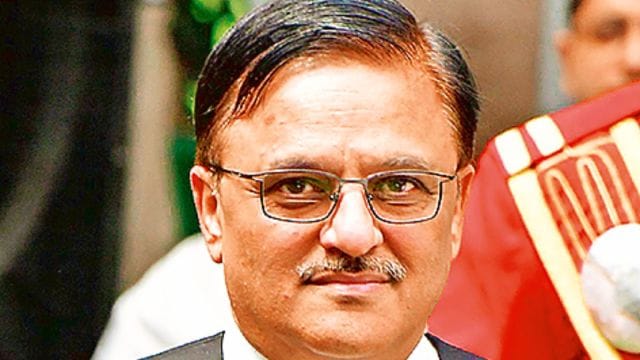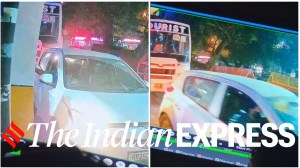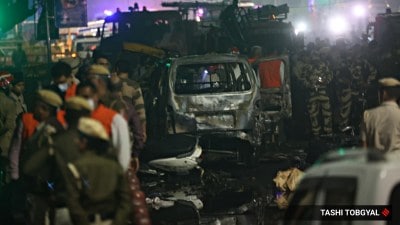Most hate speeches we see are against minorities, oppressed classes: Supreme Court judge Justice A S Oka
“There are instances in India where there are hate speeches against the religious minorities and attempts are made to provoke members of the majority to attack a religious minority,” he said.
 Justice Oka spoke of the need to “strike a balance” while evaluating whether a speech amounts to hate speech, lest it stifle the fundamental right to free speech and expression.
Justice Oka spoke of the need to “strike a balance” while evaluating whether a speech amounts to hate speech, lest it stifle the fundamental right to free speech and expression.
Supreme Court judge Justice A S Oka has said that in cases of hate speech that come to the top court most are against “religious minorities or castes which are in minority, oppressed classes like Scheduled Castes”.
Speaking via virtual mode at an event organised Friday by students of the Columbia Law School, Justice Oka said, “It’s 75 years of the existence of the Constitution, we celebrated that event on January 26 this year. But after 75 years also, there are many instances of hate speeches. Most of the hate speeches in India.. I may be wrong there because I have only the perspective of cases which come before the court… At the grassroots level, what really happens, activists like Colin Gonsalves (referring to Senior Advocate Colin Gonsalves who also addressed the gathering) will be able to tell you more effectively. But in the court, we come across cases where mostly these hate speeches are against the religious minorities or castes which are in minority, oppressed classes like Scheduled Castes.”
“There are instances in India where there are hate speeches against the religious minorities and attempts are made to provoke members of the majority to attack a religious minority,” he said.
He also referred to hate speeches for political reasons and called it a matter of great concern.
“Keep aside the penal part of it, whether a speech becomes an offence. But basically, these speeches disturb the social harmony and perhaps the activists will be able to tell you in better fashion, or those who are studying the pattern of hate speech in India very systematically, they will be able to tell you, there can be political reasons also for hate speeches,” he said.
“Maybe some political leaders, for gaining advantage in terms of electoral politics, for gaining advantage to get votes, may be indulging in hate speeches. But that’s a matter of study and it requires study because we always believe that we should have a very healthy democracy and if in a healthy democracy, political elements are going to use hate speeches, it’s a matter of great concern,” he said.
Underlining that all speech cannot, however, be categorised as hate speech based on individual perceptions, Justice Oka spoke of the need to “strike a balance” while evaluating whether a speech amounts to hate speech, lest it stifle the fundamental right to free speech and expression.
“Somebody may say that so and so delivered a hate speech. But please remember that only because one or two individuals or three or four or a group of individuals feel that it is hate speech, it does not become hate speech. There are judgments laying down in what cases it will be a hate speech. It’s not individual perception. Because if we go by individual perception that a particular utterance is a hate speech, and we start branding it as hate speech, we will be compromising on the fundamental right of freedom of speech and expression,” he said.
He pointed out that the Supreme Court and High Courts have laid down tests to determine what is hate speech and said “because when the courts deal with these hate speeches… courts also have to keep it in mind that the laws must be interpreted in such fashion and such manner that freedom of speech and expression is not taken away”.
He said “if there is no freedom of speech and expression, there is no promotion for arts, literature”. Referring to his recent judgement in the case against Congress Rajya Sabha MP Imran Pratapgarhi over an Instagram post, he said “in the judgement, we have also referred to various other aspects of art, satire, stand-up comedy. If this is divorced, in the sense that we start attacking this part of freedom of speech and expression, there won’t be any dignity to survive in life. Right to live with dignity will disappear.”
“Therefore, when courts have interpreted these provisions regarding hate speeches, the courts have tried to strike a balance. The courts have always ensured that freedom of speech and expression is protected. In fact, for offences under Section 153A IPC, there is a test laid down. Now the test is ultimately… the court has to consider what is the effect of those spoken words or written words or those expressions or visible signs… The test is what will be the effect of spoken words by considering standards of reasonable, strong-minded, firm and courageous individuals and the standard is not based on the standard of people who are weak or those who are having oscillating minds. We can’t go by the standard of those people who have a sense of insecurity or they always feel that somebody criticising them is a threat to their power,” he said.
He said “if we say that a particular speech is hate speech because it affects somebody who is very weak, and (has an) oscillating mind, then perhaps the scope of hate speech will be very widened and then we will be depriving ourselves of the freedom of speech and expression. So striking the balance is very, very important”.
Justice Oka also said the right to dissent and protest are crucial in a democracy.
“In a democratic set-up, dissent is also very crucial. When we talk about the right to express (our) own views, dissent is also very important… It is necessary for any healthy democracy to have dissent. There is a right to protest also. If something is happening in society which, according to an individual, is not correct, he has the right to protest also… But it is necessary to remember that the protest and dissent have to be by constitutional methods,” he said.
“Right to dissent is required, right to protest is also required, it is part of a dignified life. Because if as a human being, I feel that a government policy is completely wrong, it is against the interest of the common man, I should have the right to protest. Otherwise, my life… is not meaningful at all,” he said.
“Therefore, when we talk about hate speeches, ultimately the courts have to balance it with other rights available,” he said.
Justice Oka said there are universities in India where students are allowed to form associations or unions and this is to enable them to to express their grievances. “It is very important for our universities also to allow the students to express themselves, allow the students to protest if they are suffering from injustice, within the four corners of law,” he said.
He said “the provisions regarding hate speeches, or provisions which make certain speeches or utterances or spoken or written words as offences… cannot be abused or misused to prevent people from expressing their views, from expressing their dissent”.
He said the “real challenge is to educate masses against hate speeches… Unless you are able to educate masses against hate speeches, these efforts made by the courts by issuing directions will have its own limitations”.
Pointing out that the Preamble to the Constitution speaks about various freedoms and fraternity, he said, “If we are able to maintain fraternity, we are able to educate masses about the importance of fraternity, automatically the instances of hate speeches will go down. This education is very important.”







